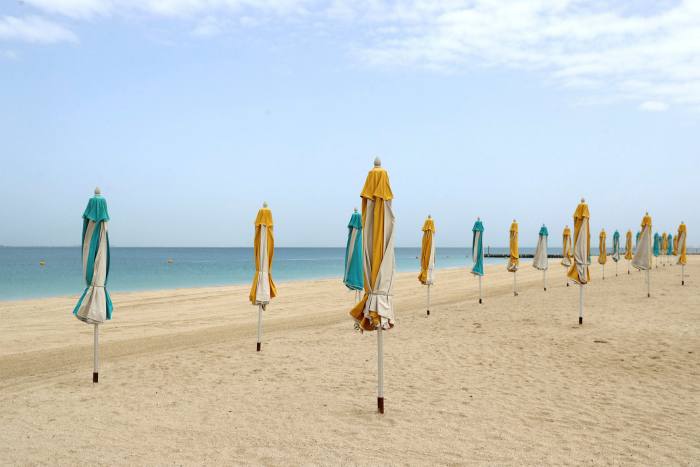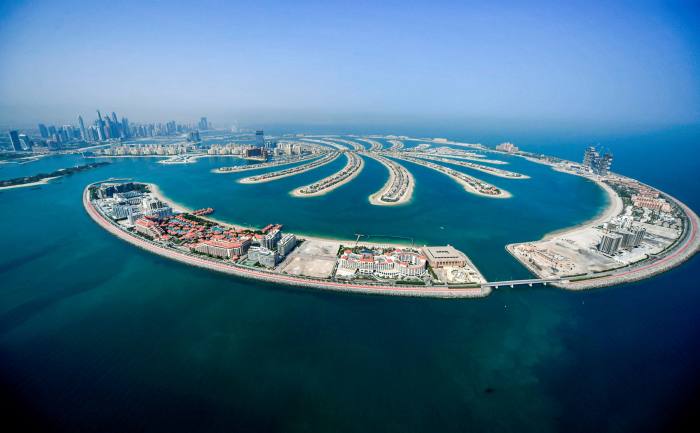Returning to Dubai in July, Calvin Lee Campbell, who works in events, found an industry — and a city — getting back on its feet.
“Live events are happening again,” he says. “Our company is hiring, our team is growing, and there are loads of opportunities to pitch for work.” It is a far cry from last June, when he lost his job and had to return, in September, to his native South Africa.
“Our whole pipeline got cancelled,” he says. “All RFPs [request for proposals] were cancelled or postponed: most of the events fell away completely.” The pandemic hit the economy hard in Dubai.

Tourism accounts for about 11.5 per cent of Dubai’s GDP, compared with a Middle East average of 8.9 per cent, according to the World Travel and Tourism Council. Overnight visitors to Dubai fell from 16.7m in 2019 to 5.5m in 2020, according to government figures. Widespread lay-offs saw a number of expats, who comprise 92 per cent of Dubai’s population, according to Standard & Poor’s, and on whose labour the country relies, return home. S&P estimates that Dubai’s population fell 8.4 per cent last year. (According to government data, the population grew by 1.6 per cent. The Dubai government did not respond to requests for comment by FT.)
The pandemic and ensuing lay-offs led to many expats, who make up 92 per cent of Dubai’s population, leaving © Francois Nel/Getty Images As demand for housing fell, so did rents. In the last six months of 2020, the average rental price in Dubai dropped 12 per cent year-on-year, according to estate agency Knight Frank. Last August, local landlord Rahul, who didn’t want to give his real name, cut the rent on his three-bedroom apartment in Dubai Marina by 20 per cent to keep his existing tenant for another year’s lease. With a mortgage to pay, it was better than leaving it empty. “There was a huge amount of uncertainty,” he says.

There is a clear move to try and get expats more invested in the economy rather than viewing being in Dubai as a temporary stay For some tenants, even slashed rental prices couldn’t mitigate the drop in their income. Alexandra McVey, 36, was living in a “dream home” in Oceana, one of Palm Jumeirah’s most sought-after apartment blocks, when she was made redundant from her job in an events agency in March. She and her two flatmates agreed a 25 per cent discount on the Dh170,000 ($46,300) yearly rent for the remainder of the lease, which ended in October.
Thinking the pandemic would soon pass, she decided to wait it out. By October, having ploughed through three months’ severance pay and much of her savings, she returned to the UK and jobless, moved in with her mother in Durham for six months. “It was like a slow-motion car crash,” she says. Tourists too stayed away, leaving empty beaches © Francois Nel/Getty Images Dubai responded quickly to the Covid outbreak, with 185 vaccination doses given for every 100 residents. Since August 30, anyone fully vaccinated with one of the WHO-approved Covid vaccines can apply for a tourist visa.

To combat the effects of the pandemic, and to continue the economy’s pivot away from oil, the government loosened visa restrictions. Last September, it introduced a five-year retirement visa for over-55s. In October, it launched a one-year remote working visa and in December, it expanded the number of professions eligible for the 10-year golden residency visa. Successful early applicants include Indian tennis star Sania Mirza and her husband, Pakistani cricketer Shoaib Malik, as well as Bollywood stars Sanjay Dutt and Shah Rukh Khan.
“There is a clear move to try and get expats more invested in the economy rather than viewing being in Dubai as a temporary stay before returning to home countries,” says Scott Livermore of Oxford Economics in Dubai. With the allure of year-round sun and the city’s shopping and hospitality scenes, which are now partly functioning again, Dubai’s appeal is widening.

“As well as people from south Asia, you are likely to see investors from Israel and potentially snowbirds from Europe, as well as those looking to establish a family base that aren’t tied to a particular location for work — Dubai serves Europe and Asia really well,” says Livermore. Queues for Covid vaccinations: 185 vaccination doses have been given for every 100 Dubai residents © Karim Sahib/AFP via Getty Images Brian, 71, who declined to give his real name, is approaching retirement and, in September, bought a three-bedroom apartment on Palm Jumeirah for Dh3.5m.
He has Portuguese and Indian passports but will retire to Dubai, encouraged by the new visas, the handling of the pandemic and the quality of life. “I enjoy the food and the facilities like golf courses and Dubai has a super infrastructure,” he says. He and his wife employ a live-in maid for Dh2,300 a month and a driver for Dh2,000 a month. Rahul has also benefited from the new visa rules. An executive in a major international firm, he has lived in Dubai since arriving from India in the late 1990s, relying on two or three-year work visas to remain. Like many of his senior colleagues, he says, he received his 10-year golden visa three months ago. Today he is looking to buy a villa for himself and his family close to the central business district, in addition to his rental home. “Dubai has handled the pandemic well. Schooling has been virtually uninterrupted.
The high vaccination rate gives us huge peace of mind,” he says. The average property price in Dubai is now 32 per cent below its 2014 peak, although there has been a small increase in the past six months, according to data from Knight Frank. The Dubai Creek Golf Club © David Cannon/Getty Images As in other global cities, the pandemic has increased demand for larger homes and those with outdoor space — and reduced it for smaller properties. The average price of a home sold for more than $1m increased 5.3 per cent in the three months to June, compared with a year earlier. Faisal Durrani, head of Middle East research for Knight Frank in Dubai, says this was driven by the sale of villas and luxury apartments in the more prestigious neighbourhoods such as the Palm Jumeirah.
The average price of a home sold for less than $1m fell 15.7 per cent over the period. Rents, meanwhile, are still falling — down 5.9 per cent in the year to June.

And the large number of new homes being built is outpacing demand from renters who want to live in them, says Sapna Jagtiani, an analyst at S&P Global Ratings in Dubai. Some 63,000 homes will be completed in Dubai this year, the highest number since 2009, according to Knight Frank.
The man-made Palm Jumeirah archipelago off Dubai © Karim Sahib/AFP via Getty Images That is good news for renters. Last spring, Lee Campbell left the flat he was renting in Dubai Marina for Dh105,000 a year. “Today I could get the same for Dh80,000,” he says. Instead, he chose a villa in Jumeirah Golf Estates. With more space and a garden, it reflects his new priorities for a home. “[Covid restrictions] mean going out is not the same experience. A lot of people are entertaining at home. I like a good braai [barbecue] and this has that and plenty of room in which to entertain.”
Source: ft
READ ALSO: FG commences construction of first Aviacargo village




